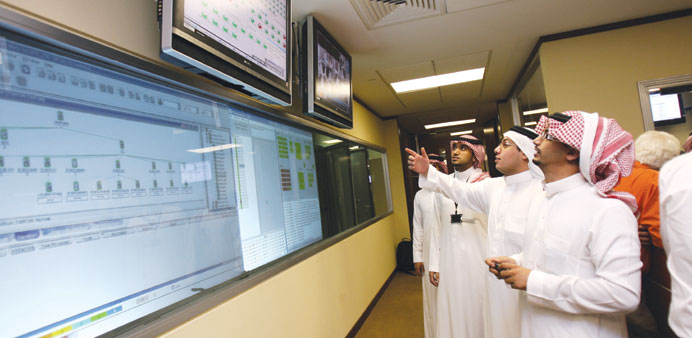Traders look at display screens inside the offices of the Tadawul All Share Index in Riyadh (file). The main Saudi index inched up 0.1% after the cabinet on Monday approved a proposal to tax undeveloped land in urban areas.
Reuters/Dubai
A sell-off in the property sector slowed Saudi Arabia’s advance yesterday after the government approved a plan to tax undeveloped land, while Oman rallied because of the return of Sultan Qaboos after lengthy medical treatment abroad.
The main Saudi index inched up 0.1% as food maker Savola Group extended its rebound, jumping 2.9%.
Another major support was Saudi Cement Co, which rose 2.5%. Major builder Abdullah Abdul Mohsin al-Khodari and Sons jumped 2.8% and modular building producer Red Sea Housing Services rose 3.7% after the Riyadh government took a major step towards implementing its stalled housing programme.
Aiming to push more land out into the market, the cabinet on Monday approved a proposal to tax undeveloped land in urban areas. Much urban land is currently owned by wealthy individuals or firms who prefer holding it as a store of value, or trading it for speculative profits, to the process of developing it.
It is unclear if the tax will apply to property developers, some of which have large land banks, but investors started dumping the stocks in the belief that land prices will be forced down by the tax.
Dar Al Arkan, one of the biggest Saudi Arabian developers, tumbled 6.5% and Emaar Economic City was down 6.6%.
According to Dar Al Arkan’s latest financial report, its revenue from land sales was 2.9bn riyals in 2014, while its total revenue was 3.1bn riyals. The company said it sold land with basic infrastructure.
Mazen al-Sudairi, head of research at al-Istithmar Capital in Riyadh, said rising prices and limited availability of land had dampened many areas of Saudi business activity, so the tax could have a broad, positive effect on the economy.
“The decision opens growth opportunities even to other sectors. Retailers, which mainly depend on leases, can now buy land and expand. Cement firms will grow with rising demand, and even banks will prosper as they will lend to those firms.”
Dubai’s index edged up 0.3% as local stocks were mixed. Dubai Islamic Bank, up 2.0%, was the main support.
Builder Arabtec rose as much as 2.0% after winning a $283mn contract from Saudi Aramco to build 380 villas in Saudi Arabia, but then came under renewed pressure and closed 1.2% lower.
On Sunday, Arabtec said it had swung to a net loss of 94.4mn dirhams ($25.7mn) in the fourth quarter of last year. It also proposed no cash dividend, offering a 5% bonus share issue instead.
Abu Dhabi’s bourse edged up 0.2% as Aldar Properties jumped 2.6% ahead of a dividend registration deadline and after announcing it had sold all 281 land plots at its new Al Merief development in just one week, which will generate 600mn dirhams of revenues in the coming quarters.
Oman’s bourse rose 1.2%, its biggest daily gain in more than two months, in a broad rally after Sultan Qaboos returned home “in complete health” on Monday from an eight-month medical stay in Germany.
Qaboos, 74, has been absolute ruler of the Arabian peninsula state since 1970, but his absence in Germany since July had led to growing concern about his health.
Egypt’s market inched down 0.1% in a lacklustre session. Ezz Steel tumbled 4.8% to 14.56 Egyptian pounds after two brokers cut their fair value estimates for the stock.
On Monday, EFG Hermes cut Ezz Steel’s fair value to 21pounds from 23pounds, and on Tuesday CI Capital reduced its price target to 18.50 pounds from 23.50 pounds.
Elsewhere, the Kuwait index edged down 0.3% to 6,409 points, the Oman index rose 1.2% to 6,283 points and the Bahrain index slipped 0.3% to 1,450 points.

